Russia kills Ukraine’s children
First, the video below isn’t, as described, a confession. It’s a statement, but not a confession in the sense of a plea of repentance. The video evokes emotions, precisely because religious ethics demand the kindest of consideration for the children among us. “Suffer little children,” Jesus says, which is archaic language meaning put up with them, and is completed with being brought to me. It is a commonly quoted text, on whose basis children are placed central to family life, but Jesus has much to say about those adults who make children a central focus for the family, and those parts are less commonly quoted (the Gospel according to St Matthew, chapter 19, verses 13 to 26):
Then were there brought unto him little children, that he should put his hands on them, and pray: and the disciples rebuked them. But Jesus said, Suffer little children, and forbid them not, to come unto me: for of such is the kingdom of heaven. And he laid his hands on them, and departed thence.
And, behold, one came and said unto him, Good Master, what good thing shall I do, that I may have eternal life? And he said unto him, Why callest thou me good? there is none good but one, that is, God: but if thou wilt enter into life, keep the commandments. He saith unto him, Which? Jesus said, Thou shalt do no murder, thou shalt not commit adultery, thou shalt not steal, thou shalt not bear false witness, honour thy father and thy mother: and, thou shalt love thy neighbour as thyself.
The young man saith unto him, All these things have I kept from my youth up: what lack I yet? Jesus said unto him, If thou wilt be perfect, go and sell that thou hast, and give to the poor, and thou shalt have treasure in heaven: and come and follow me. But when the young man heard that saying, he went away sorrowful: for he had great possessions.
Then said Jesus unto his disciples, Verily I say unto you, That a rich man shall hardly enter into the kingdom of heaven. And again I say unto you, It is easier for a camel to go through the eye of a needle, than for a rich man to enter into the kingdom of God.
When his disciples heard it, they were exceedingly amazed, saying, Who then can be saved? But Jesus beheld them, and said unto them, With men this is impossible; but with God all things are possible.
(The young man was mistaken, in any event: he did not keep these things, for he had great possessions, and had therefore not loved his neighbour as himself; this was the root cause of his sorrow. Read Peter Singer’s 1972 dissertation Famine, Affluence, and Morality if you’re curious to know why.)
Here endeth the lesson.
Here beginneth the lesson.
Ukraine pleads for its children
Ukraine has, since the outbreak of war, placed its children in prominent view when pleading for support to rein in the terror being wreaked upon it. Early on in the conflict, President Zelenskyy gave an interview in which he stated that his heart had stopped beating at news of the deaths of 250 Ukrainian children. I am very sympathetic to that sentiment. As was Amnesty International, when it expressed an unsympathetic view on the fact that Ukrainian troops defending their population station themselves in schools and kindergartens, thus, according to AI, drawing fire to where children are. It’s a view. But many photos of destruction in Ukraine feature children and their playgrounds and playthings. Here are a few of them.
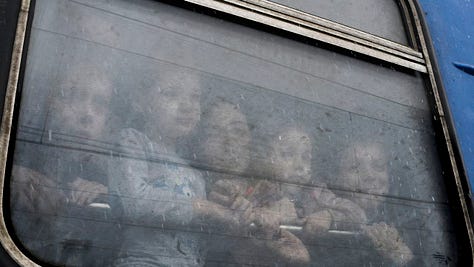


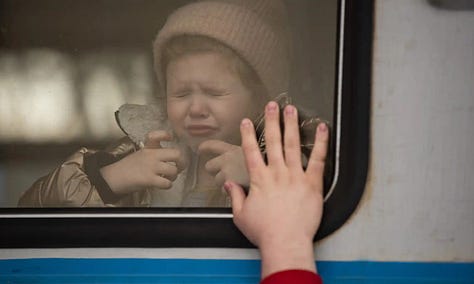

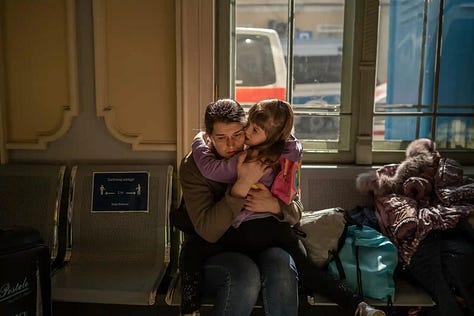
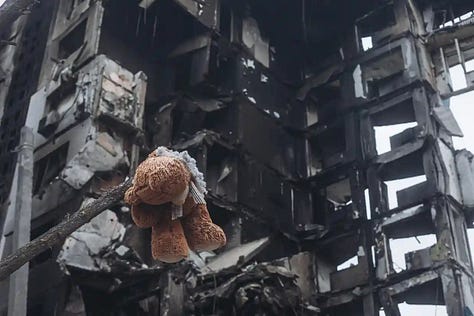
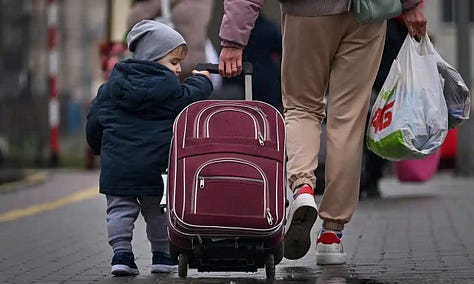
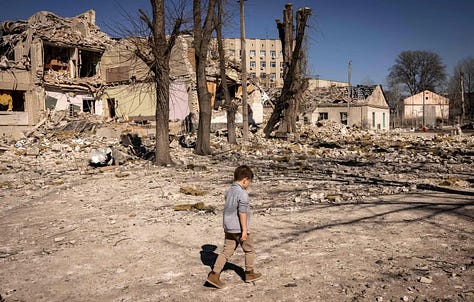
It’s true; it tugs at heartstrings; and it can — cynically — be viewed as manipulative, if, in response to the enquiry Why not just show them the deaths of everyone?, the Ukrainians hold to the idea that emphasising the losses associated with children will garner more support. It’s in that latter light that the Ukrainian publication of the following video may be seen; if you support Ukraine, if you stand with them, then, no question, you stand with Ukraine’s children. But more revelatory is the nature of what is said in the video and how it is said, rather than the reasons for which it is published.
Take a look at the video (it’s 2 minutes long), and then forget all the above. Because this war is not about children. The deaths of children, the loss of their futures and of their playgrounds, is not irrelevant to the war, but it’s not what the war is about. You might be tempted to assert that he who does not place prime importance on the child victims doesn’t care about the kids, and that is false.
The soldier featuring in the video killed children. And he killed adults. And he will likely kill both again. He holds no vendetta against Ukrainians, or their children, or so it seems to me. He does as he is told. And doing as you are told is what the war is about.
He’s dispassionate. He speaks truth. He may be a little squiffy, but it’s the truth he tells (maybe even because of that). Like John Wayne before him, he is a man who’s got to do what he, that man, has got to do. Got to, here, is ordered. If he refuses, he adds one more to the number who’ve got to be liquidated: himself.
His fear of disobeying, if he harbours any, is not apprehension at a reprimand or discharge. It is the fear of a bullet. Fired at him as if it were a box ticked on a discipline form. Reprimand is a form of discipline born of letting the side down, and, hence, of shame. Summary execution, on the other hand, is a means of reprimand that avoids hurting the miscreant’s feelings: as with lame horses, it’s almost compassionate.
He doesn’t cite the order as an excuse, but as a reason. He’s not apologetic: how many children were there? Forty. There were 40 children. Like counting the yellow sweets in a bag of M&Ms. “He ate the M&Ms, because he was told to.” Not because he was hungry.
The conscience that one might plead for is absent. We may ask, “How can he live with himself?” He would answer as would Rodolfo in Puccini’s La Bohème: “E come vivo? Vivo!” He doesn’t ask himself, or anyone else, let alone his commander, “Why?” Why kill the kids? Why kill anyone? Why is not a word in his vocabulary. Only what; no why.
If we, you and I, understand this, we understand better how his society functions; and, what is more, we may gain an insight into how our societies are starting to function. His is a free society, far freer than any democracy. But: theirs not to reason why, theirs but to do and die (Alfred, Lord Tennyson: The Charge of the Light Brigade).
Democracies ringfence freedom at every turn and people subscribe to the necessity of that for the greater good. Nonetheless, what democracies allow without restraint is the ability to question why. It is the answers to that question that bring about change in a democracy. Democracy’s ringfencing is not always done by means of the law, however: systems, structures, prerogatives and devices are set up that, themselves, constitute limits on action, and inaction. Even without a statutory basis, a nebulous, if recognisable, greater good is perceived as constituting their purported, putative or patently obvious aim.
We’re all God’s children: just like Damien was
(Damien is the Antichrist in the 1978 film Omen, in case you don’t know.)
One might ask, “Whose greater good?” If we defined the greater good, how many definitions would we have? The only element common to them all would be the ability to question whose greater good is best served by the system under which we operate. And yet, when such structures as exist under democracy are defied, it can be precisely the law, as laid down by the democratically elected representatives of the people, that is relied on to succour, not to the supposed victim, but to the miscreant. Last year’s rush of British prime ministers brought forth calls for a general election, but none was required by law and, so, none was called. George Santos has lied about himself and his actings on numerous occasions, but there is no law in New York state providing for the removal of a senator who tells a pack of fibs on his CV or lies about a sick dog. Hungary’s Victor Orbán reputedly misappropriates EU funds to support his ruling party there and cocks a snoot at any who criticise that, including the EU, which is unable to take any measures against his country to evict it from its number, much as some members would like to and to evict Russia from the UN Security Council. Hence, when the greater good in whose favour the law militates is widely perceived as a perversion, the system, bearing the name democracy, is no democracy, at least insofar as it upholds the perversion in question. The next time a public official refuses to offer an explanation and simply points to what the law says, remember this.
Democracy is in a state of malaise. Countries like Kenya and Uganda pass laws to persecute homosexuals and, at the same time, sign up to UN conventions that vaunt personal liberty and freedom of expression. Zimbabwe pleads for international aid and, meanwhile, subscribes through official channels to wholesale exports of gold to Dubai. You can barely find a direct flight by a Belgian carrier to the US. But there’s a regular Air Zimbabwe service to Dubai. After financial turmoil at Air Zimbabwe in 2004, suspension from IATA and huge fare increases (by 500%) to cope with galloping inflation, stability was achieved in the Zimbabwean skies in 2014, when the airline was taken into government ownership, despite which its financial reporting is by no means, by even the most rudimentary standards, adequate. It provides a service to Dubai, which, according to Al Jazeera, is a muling route for money-laundering purposes. However, all the gold exports are legit: the paperwork is watertight. Except, the gold was at no time encased in the subsoil of Zimbabwe. I would ask the Zimbabwean President, Emmerson Mnangagwa, what he thinks of all this, but doing so would set me back a tidy 200,000 dollars, and so I demur.
For some, including in Zimbabwe, the malaise under which democracy suffers is suffered in preference to the malaise that would be suffered under autocracy. The thing is that democracy, in some places, is barely distinguishable from autocracy, in others.
In Russia, like its government, freedom is absolute. But it comes at a price: compliance. Comply, and thereby show loyalty, and you are then free in all else (even if you’d be advised to get yourself a Kalashnikov). It is anarchy under government. Absolute power confers freedom, and it demands compliance. Democracy, by contrast, encroaches on freedom and simply begs compliance: in part, because it’s the law and, otherwise, for that greater good, for good law. Next time you see a video like the one above, it will, again, shock you. But, next time, you won’t be surprised.
Those who hold to the fundaments of democracy as an idea will understand why men like the one in the video have to be stopped: not just because of the killing; not just for the kids; not even just for Ukraine. No: for us. This man can’t ask why; he’s incapable of conceiving the question. So, to him, any one of us could also be what. And, for so long as you, dear reader, are indeed able to conceive the question Why?, you will continue to potentially stand in the way of this man’s duty of compliance.
The resolve that you formulate to ensure that this man and those who issue him with orders must be stopped, whether by standing with Ukraine or by standing with wherever it is that you’re standing right now, must, perforce, likewise be formulated to stop the threats to the freedom you desire and the democracy you think will procure it. The threats that exist where democracy nominally reigns free and where freedom is nominally democratic, and not just in Russia. After all, freedom in Russia is absolute: the perceived cynicism that President Putin expresses about democracy has its footing in this: absolute freedom is compelled, whether you want it or not; democratic freedom is constrained and will never be free.
If democracy and freedom are what Ukraine, or anyone, is fighting for, in how far are the fighters, are we, prepared to even examine what it is that we mean with concepts like freedom or democracy and cast question on whether we have ever been free and democratic?
And when, do we suppose, is it that a nominally democratic society realises that it is no longer de facto democratic?
(a) At the moment it is declared to be democratic?
(b) Never, for as long as it is nominally democratic?
(c) On the day of the election?
(d) Some time after the election, as the pirates haul up the ropes by which they clambered aboard the good ship Democracy (and even assuming they’re observed doing so)?
Three thoughts to ponder as elections — and mortality — loom across our globe:
There can be no re-run of an election on the basis that it is only in hindsight that the populace tumbles to what a candidate intended. The Brexit referendum is evidence of that.
Count Dracula cannot be seen in a mirror. For the rest, he’s a gentleman. People need to check mirrors if they want to know whether there’s a vampire in the room. But, then, checking the mirror will tell you only one thing: that the danger you perceived simply isn’t there.
When you look in a mirror, do you see the possessions; like those the young man who spoke to Jesus saw?



